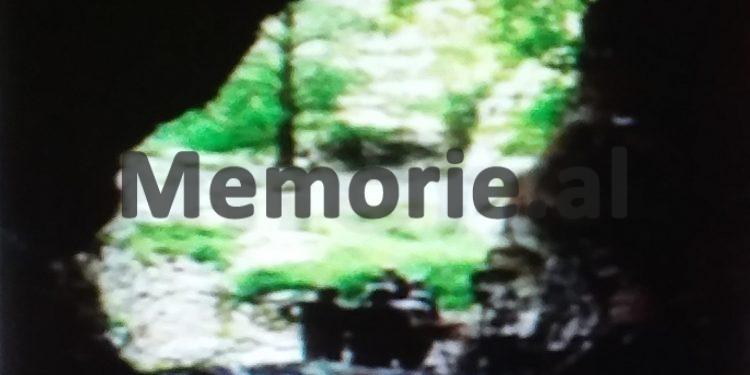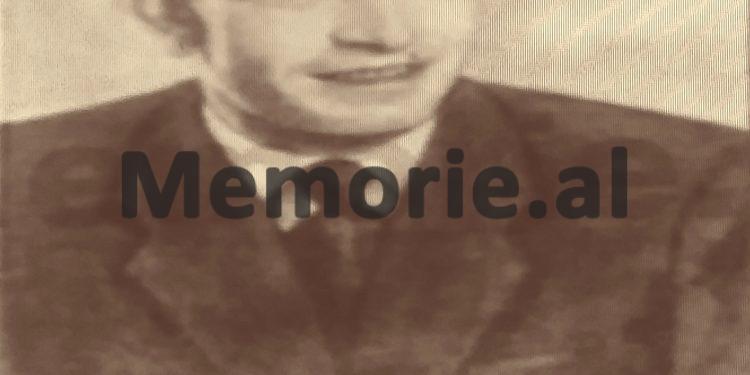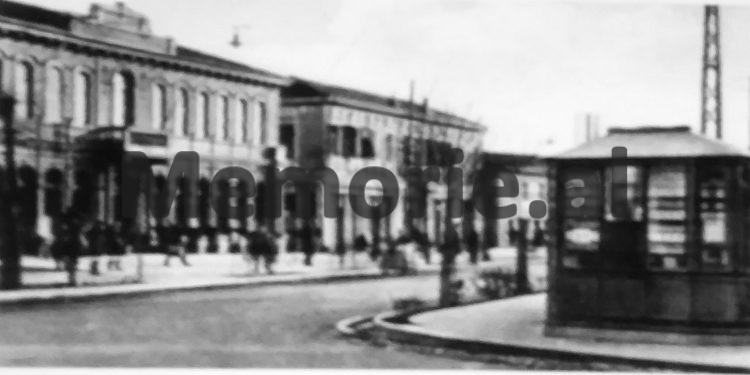Dashnor Kaloçi
Memorie.al/The story of the former assistant doctor Kel Vata, about the tragic story of his uncle, Gjergj Vata, former Governor of Shkodra and deputy chairman of the Mountain Committee, who was killed by the Security people in 1946 and after they had they robbed him, cut off his head with an ax, and threw him into the abyss. The finding of the bones became possible after Prenush Nika from Shllaku, had told Gjelosh Doda: “I want, I want to leave a will that you will keep a big secret from me because I have a concern in my soul. If the time ever comes and Gjergj Vata has a living person, tell me that here in this place I buried that brave man with my own hands ”
Only at the beginning of 1991, when the communist regime was collapsing, did I become interested in finding the remains of my uncle, Major Gjergj Vata, the former Governor of Shkodra. After much searching, with the help of some of my friends in the Dukagjini area, I was able to find the place where he was buried in the Shllak area. “But when we opened the tomb, we could only find the bones of the body, because the skull was completely missing.” The man who speaks and testifies about that tragic event, is 78-year-old Kel Vata, a former assistant doctor in the city of Shkodra, who tells the whole painful story of his family and uncle, Major Gjergj Vata, former District Commander of Shkodra who was killed and massacred in the most barbaric way by the State Security forces in 1946.
Vata family from Temali
Gjergj Vata was born on March 14, 1914 in the village of Temal in the Prefecture of Shkodra, where his family comes from. Gjergji’s father, Vat Gjeloshi, in 1878 had accompanied the representatives of the Dukagjini Highlands, Gjek Beg Shllaku, and Mar Lula, in the Albanian League of Prizren. Around 1905, Vat Gjeloshi’s family, for economic reasons, moved from the village of Temal and settled in the Arra e Madhe neighborhood in the city of Shkodra. During those years, Vat Gjeloshi had four sons and a daughter, who were named: Kole, Gjon, Gjergj, Luçie and Lorenc.
The eldest son, Kola, who was born in 1900, after graduating from Saverian College with excellent results, went to work for some large merchants in the city of Shkodra. In June 1924, Kola was mobilized as a soldier in the fanolist forces led by Rexhep Shala, being assigned to the battalion commanded by Vas Kiri.
During the march made by that unit to Tirana (June 8, 1924) in order to overthrow the Government of Shefqet Vërlac, Kola was killed in an attempt by government forces in the village of Balldre in Lezha. From that time and throughout the period of the Monarchy, the family of Vat Gjeloshi remained in a permanent enmity with King Zog. After the murder of Kola, the other son of Vat Gjeloshi, Gjoni, remained at home to take care of the family problems, while Gjergji, finished with excellent results the high school of the Frets “Ylliricum” in the city of Shkodra. While the youngest son of the family, Lorenci, after graduating with excellent results from Saverian College of the city of Shkodra, throughout the period of the Monarchy, worked as a clerk in the local administration of the Prefecture of Shkodra, from where he was able to gain a right to study at the University of Bologna in Italy.
George, at the Academy of Turin
After graduating from the Franciscan College in 1929, George Vata was able to win a state scholarship to pursue higher studies at the Military Academy of Turin in Italy. In this regard, his nephew Kel Vata, testifies: “The right to study to study in that military academy, uncle Gjergj, was taken away by the then Minister of Education, Hil Mosi, only after the intervention of Padre Gjergj Fishta, who had had George, the best student in the Franciscan Lyceum. At the Academy of Turin, Gjergji studied for five years in the Artillery branch, which he completed with excellent results in 1937, receiving the rank of lieutenant.
After graduating, the Commander of that Academy called Gjergji to his office and said: “Mr. Vata, you have finished with excellent grades, but your homeland, Albania, is a poor country and has no money to ‘you paid. “If you want you can stay in Italy, where you will have an excellent military career and a very high salary.” After those words, Gjergji replied: “Mr. General, I am Albanian and I did not come to stay in Italy, but I will return and serve in my country, taking into account any sacrifice”.
And he made that word a reality by returning to Albania in August 1937, where King Zog offered him several military duties in various units. But he refused to serve in the Royal Army, saying he could not serve the man who had been responsible for the murder of his brother, Kola, in June 1924. After that with the intervention of some friends in the city of Shkodra, Uncle Gjergj, agreed to take over the position of Mayor of Shllak, where he served from 1938 to 1941. During that period, in addition to the position of Mayor, Gjergj, was taken and with the reconciliation of various conflicts and the reconciliation of the bloodshed of the highlanders of that deep area in the northernmost part of Albania “, recalls Kel Vata, regarding his uncle, Gjergj, who graduated with excellent results in the Military Academy of Turin in Italy.
Major Gjergj Vata, governor of Shkodra
In the autumn of 1941, after Gjergj Vata had worked for almost four years in the Municipality of Shllak, he was called to the General Command of the National Army in Tirana, where it was announced that he had been appointed an officer with the rank of lieutenant in the garrison. of Kukes, where he would perform the duty of Battalion Commander in the village of Bicaj. In this regard, Kel Vata testifies: “During the time that Uncle Gjergj was appointed in Bicaj of Kukës, on his own initiative and with the approval of the superior command, he opened two six-month courses for the training of reserve officers and non-commissioned officers of that Prefecture. Based on the good work he did in that unit, in the spring of 1942, the General Command transferred him to the city of Shkodra, appointing him to the position of Deputy Commander of the District and giving him the rank of captain.
Towards the end of September 1943, Gjergji was notified of the rank of First Captain and was appointed to the post of District Commander of Shkodra, having the offices in the building of the prefecture of that city. During that very turbulent time, Gjergji, with all the troops under his command, tried to maintain order and tranquility in the city of Shkodra, which had many problems, where he miraculously escaped an assassination attempt by the guerrilla units of the city. In mid-September 1944, Gjergji was given the rank of major and was appointed Governor of Shkodra. During that time, he had some conflicts with the German command that was in the city of Shkodra, as he had several times intervened for the release from prison of some arrested communists.
One of them was a 16-year-old boy from the villages of Kukës, who was captured by a German patrol attaching tracts on November 15, 1944. After being captured by the Germans, his mother went to Gjergji’s house and said to our grandmother: ‘By the grace of God, tell your son, Major George, to save me the only boy I have the light of my eyes’. After that Uncle Gjergj went to the German command and told Major Hauzding to release the boy because he had been lied to by the communists. The German commander refused to release him, telling him that he could never break the laws of war. After the refusal of the senior German officer, the debate flared up and Uncle Gjergj put his hand on his belt and said: ‘Mr. Major, you cannot break the laws of War, but neither can I break the traditions and customs. of the Albanian, when my friend trusted me. “One of us will not leave this office alive without the release of that boy”, Kel Vata recalls regarding the debate of the German officer with Major Gjergj Vata, who managed to release that young communist boy, who in the post-war years was became Colonel and Branch President, and unfortunately never asked about the man and family who saved his life.
Major Gjergj Vata, Deputy Chairman of the Mountains Committee
Major Gjergj Vata held the position of Governor of Shkodra until November 28, 1944, when Enver Hoxha’s partisans entered that city triumphantly. On the morning of November 27, 1944, Gjergj Vata attended a meeting held by nationalist leaders in the city Prefecture building, where they were divided into two groups: those who would fight in the mountains against communist forces and those who would return home. Theirs. Regarding this and the further activity of Major Gjergj Vata, his nephew Keli, testifies: “Uncle Gjergj had all the opportunities to leave Albania, as did many other nationalist exponents, but he refused to leave, saying that he would stay in Albania to fight communism until he had a living spirit. In the last days of November 1944, Gjergji joined the forces of Mark Gjonmarkaj consisting of 1000 people and together with many other nationalist leaders such as Halil Alia, Pashuk Bib Mirakaj, General Prenk Përvizi, Captain Gjergj Lula, etc. left the city in the direction of Dukagjini Highlands.
Those anti-communist armed forces fell several times in the struggle with the pursuit units, causing numerous casualties on both sides. The first attempt was made on December 5, 1944 on the Raja Rock in the Nikaj-Mërtur area, where after several hours of fighting, many partisans and nationalists were killed. After this battle, all the nationalist leaders with the forces they commanded were divided in their areas and Gjergji took refuge in the Dukagjini Highlands. In February 1945, he participated in the meeting that the nationalist leaders of the anti-communist resistance held in Orosh of Mirdita, where they created the organization “Committee of the Mountains”. At that meeting, Gjergji was appointed deputy chairman of that Committee and chairman of the Dukagjini sub-prefecture. Regarding the anti-communist activity of Gjergj Vata at that time, the former Director of State Security Rakip Beqa wrote in his book “The hostile activity of the Catholic Clergy 1944-1972”, where among other things it is said: Gjergj Vata, leader of this gang sent to the Archbishop of Durrës, Vinçens Prendushi, it is written:
‘Malci e Veriut. 4.I.1946. Your Excellency, on behalf of all those who still carry the flag of Albanian nationalism in the mountains of Dukagjini, I address you with this letter: of Enver Hoxha, escaped. During this time, although persecuted and persecuted, we tried to keep the morale of the people high, we organized internal and external detachments, we connected with all the fugitives of the country, in a word we prepared to respond to the call of the homeland, which we believe will soon call us to give the final blow to the most terrorist government our history knows. I assure you that all the provinces of the North are connected and assisted by the allies and by the K.Q. of Tirana, while we, due to the lack of a connection, were left completely behind ‘. With the highest considerations. Major Gjergj Vata.
According to the former Director of State Security, this letter from Gjergj Vata was given to a member of his gang, Martin Sheldia, who was able to enter Shkodra illegally, up to the residence of the Franciscan Province, Padre Mati Prendushi, and was able to “he handed it to him, telling him to send it without delay to Vincens Prendushi in Durrës”, Kel Vata recalls about the anti-communist activity of his uncle, Major Gjergj Vata.
The tragic murder in 1946
From 1944 when he escaped until December 1946, Gjergj Vata remained sheltered in the mountains in the Dukagjini area, organizing the anti-communist resistance. In retaliation, the Communists arrested his brother, Lorenc, who was initially sentenced to death and later pardoned, and he served a full 25 years in prison. In those years, Gjergj Vata carried out his activity in the Shllak-Pult-Nikaj-Mërtur areas of the Dukagjini area, but the quietest place where he stayed constantly was the village of Pog i Pultit. In this regard, Kel Vata testifies:
“Among the main families that sheltered and supported Gjergji with bread, were those of Gjon Ndue Puka and Gjon Pjetrushi in Shllak, whose houses were burned by the communists and rotted in prisons. Also, his courier was Gjergj Ndoja from Pogu, who died in Security tortures without telling anything about him. During that time, Gjergji fell several times in an attempt with the Security forces, where some of his close friends such as Ndoc Jakova, Father Anton Harapi, Dom Alfons Tracki, Lef Nosi, etc. were killed or captured alive.
Although he was left completely alone, he refused to flee abroad even though the Anglo-American missions offered him a special airplane departure.
At that time, the Chairman of the Internal Affairs Branch of Shkodra, General Zoi Themel, received a lot of information about the areas where Gjergji was sheltered, but the pursuit forces could never follow in his footsteps. After that, in a meeting with the main chiefs of the Branch, Zoi Themeli said: “I no longer need useless reports on where Gjergj Vata is hiding, I need his head. “This is the last report I expect from you.” A few days later, on December 7, 1946, three people paid by the Security were able to kill Gjergj behind his back, while he was passing in the area of Shllak, to the Red Rock Cave where he was hiding at the time.
There was a great deal of silence about the gruesome murder of Gjergj Vata, and our family learned of it only three or four years later in the late 1950s. After the murder, Gjergji’s mother, Sosja, was deported to Berat, while our family was deported to Tepelena. Both the circumstances of the murder and the finding of his body, for me and our whole family remained a great hostage, which tormented me throughout the communist regime of Enver Hoxha, where we had no opportunity to seek them… Only at the beginning of 1991, when the communist regime was collapsing, did I become interested in finding his remains and after much searching, with the help of some of my friends in the Dukagjini area, I was able to find the place I was looking for.
Gjelosh Doda told us that, to whom in 1985, Prenush Nika from Shllaku, had said: “I want, I want to leave a will that you will keep a big secret from me because I have a concern in my soul. “If the time ever comes and Gjergj Vata has a living person, tell me that here in this place I buried that brave man with my own hands”. After that, in October 1993, Kol Gjoka, Gjelosh Doda and his son Tonin and I went and started the excavations where Gjeloshi told us. “But to our surprise we could only find the bones of the body there, because the skull was completely missing”, concludes his story 78-year-old Kel Vata, regarding the finding of the bones of his uncle, Gjergj Vata, who was killed Security men in 1946 and after robbing him, cut off his head with an ax and threw him into the abyss.
(Attached to this post, we are also publishing some photos 🙂
1 and 2. Gjergj Vata in military and civilian uniform.
- The cave where in 1993 the bones of Gjergj Vata were found without the skull.
- View of the city of Shkodra, where Gjergj Vata served as Governor.
- The reburial ceremony of the remains of Gjergj Vata in the cemetery of Rrmaj of Shkodra in 1993, where they appear: Kel Vata (with glasses), Historian Mentor Quku holding the keynote speech, MP and Deputy Chairman of the Democratic Party, Ali Spahia, etc.).
Memorie.al














